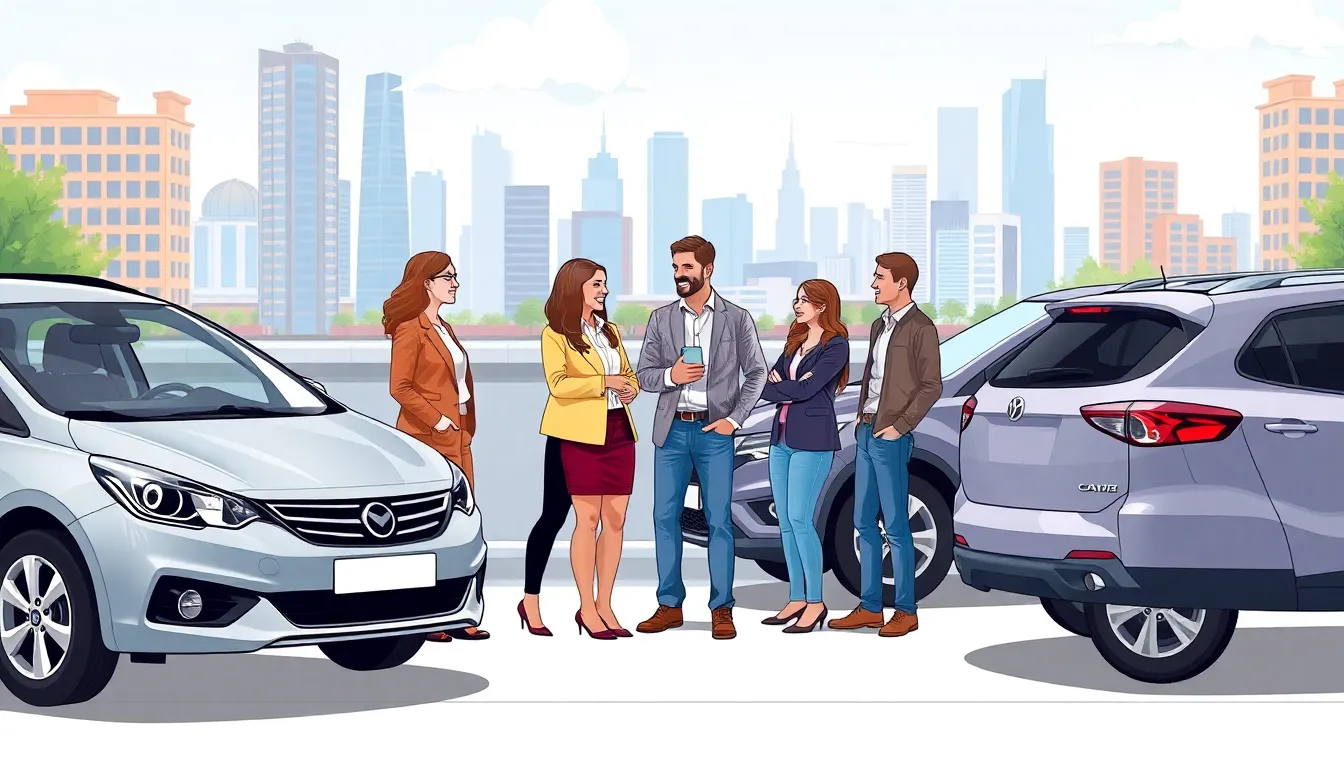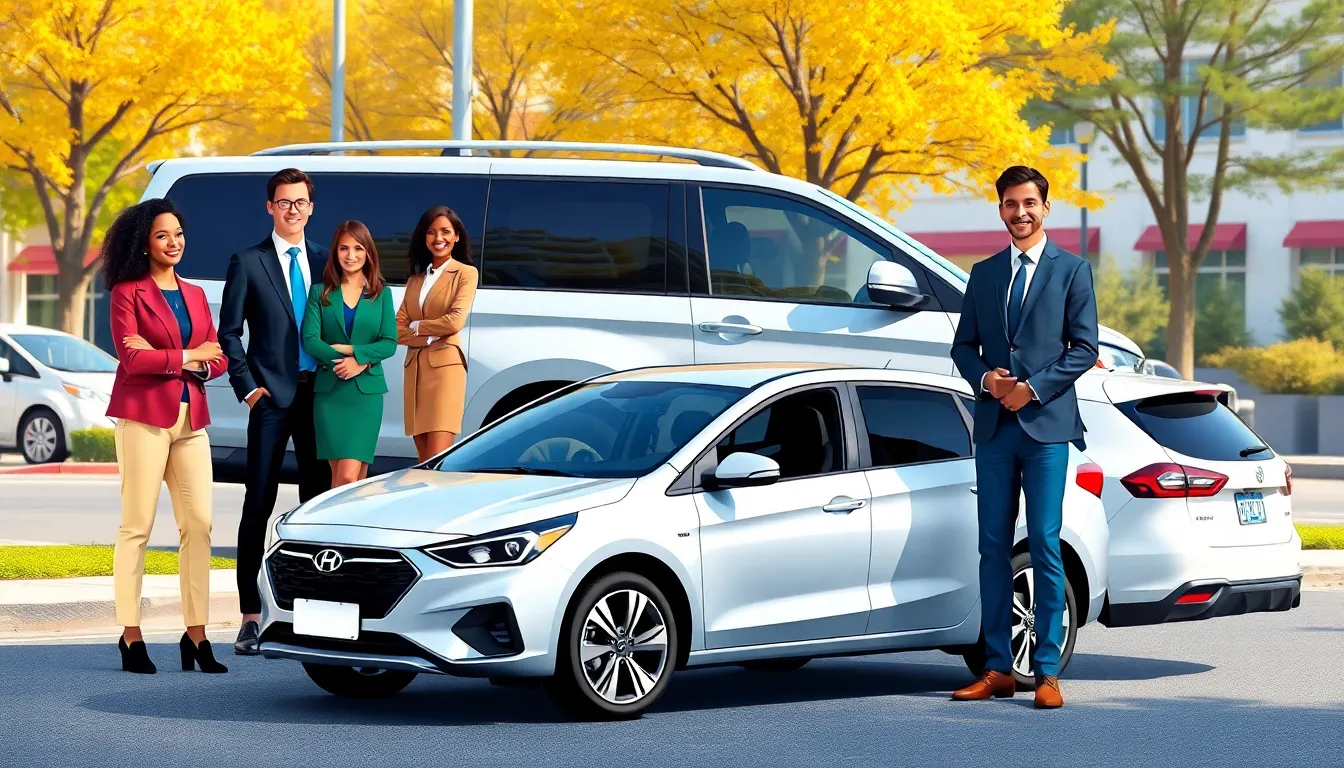Deciding whether to rent or buy a car can feel like choosing between pizza and tacos—both are great but serve different cravings. On one hand, renting offers the freedom to switch rides faster than a chameleon changes colors. On the other, buying a car means you can finally stop pretending that you’re a responsible adult when the rental company asks for your insurance details.
Table of Contents
ToggleUnderstanding Renting Vs Buying Car
Renting a car offers a unique blend of flexibility and convenience. Individuals can change vehicles every few months, adapting to their needs without long-term commitments. Costs associated with rentals often include insurance and maintenance, typically bundled into monthly payments.
Buying a car involves a different set of responsibilities. Ownership means individuals can customize their vehicles and drive unlimited miles. Monthly payments often contribute toward equity, a financial advantage not present with rentals.
Financial implications vary significantly between the two options. Renting typically involves lower upfront costs, while purchasing requires a larger initial investment. Over time, however, ownership can provide long-term benefits, like not having monthly payments after the loan period ends.
Insurance needs also differ. Rentals generally include coverage in their agreements, simplifying the process. Conversely, car owners must manage their own insurance policies, often leading to variations in costs based on individual circumstances.
Market conditions affect both decisions. In times of economic uncertainty, renting may emerge as the preferred choice, as it allows individuals to avoid large, long-term expenditures. Alternatively, stable financial periods might encourage buying, with lower interest rates making it an attractive option.
Ultimately, the decision rests on personal preferences and lifestyle requirements. Those valuing flexibility may lean towards renting, while individuals seeking long-term investment often choose buying. Each option presents distinct advantages, tailored to different user experiences and financial goals.
Advantages Of Renting A Car


Renting a car offers significant benefits that cater to various needs and lifestyles. These advantages often make it an appealing choice for individuals and families alike.
Flexibility And Freedom
Renting a car allows individuals to choose different vehicles based on specific needs. Options range from compact cars for city driving to SUVs for road trips. With rental agreements generally spanning short periods, users enjoy the freedom to switch vehicles frequently. Transitions between vehicles are seamless, accommodating life changes, travel plans, or personal preferences. Flexibility extends beyond vehicle choice; it allows users to avoid long-term commitments, making it easier to adapt to new circumstances.
Lower Upfront Costs
Lower upfront costs characterize car rentals, making them accessible to a wider audience. While purchasing a vehicle often entails substantial down payments, renting requires minimal financial investment. Monthly rental fees are typically lower than car payments, allowing users to allocate funds elsewhere. Insurance costs may be bundled into rental agreements, further minimizing initial expenses. Individuals can drive a newer vehicle without the financial burden associated with ownership, enjoying modern features and reliability. Ease of access coupled with lower costs makes renting a financially sensible option for many.
Advantages Of Buying A Car
Purchasing a car comes with numerous benefits that cater to different needs and financial strategies. Below are key advantages associated with buying a vehicle.
Long-Term Investment
Buying a car leads to long-term financial benefits. An owned vehicle allows for equity building over time, which is an important consideration for many buyers. Typically, after the loan period concludes, the owner no longer faces monthly payments, differentiating this choice from renting. Owners enjoy the freedom of using their car as desired without restrictions imposed by leases. Consider how a well-maintained vehicle can meet transportation needs for several years, potentially offering a return on investment. Resale value exists as an additional financial consideration, providing owners with an opportunity to recoup some costs when selling or trading in the vehicle.
Asset Ownership
Ownership of a car offers a sense of security and control. Car owners maintain full rights to their property, which permits customization or modifications to enhance personal preferences. Having full ownership often translates to reduced stress compared to renting agreements, where guidelines limit vehicle use. Increased autonomy in decision-making empowers owners to both choose how to maintain their vehicle and when to sell it. In contrast to rental agreements that might include restrictions, ownership allows for complete flexibility in usage, making it significant for those who prioritize personalized experiences. This control contributes to overall satisfaction and fosters a connection between the owner and their vehicle.
Factors To Consider
Deciding between renting and buying a car involves several key factors. Each aspect impacts personal preferences and financial situations.
Financial Impact
Renting generally incurs lower upfront costs compared to buying. Monthly rental payments typically fall below the average car payment, providing financial relief. Rentals often include insurance and maintenance fees, simplifying budgeting for users. On the other hand, purchasing a vehicle requires a larger initial investment but offers potential long-term savings such as equity building and the cessation of payments after loan completion. Potential resale value highlights an additional financial advantage for car owners. Managing ownership costs, including insurance, varies significantly, as policies depend on the type of vehicle and coverage levels.
Usage Frequency
Usage frequency plays a crucial role in the decision. Renting suits individuals with sporadic driving needs, allowing them to change vehicles based on specific situations. Flexibility encourages users to switch between compact cars and larger SUVs as necessary. Ownership benefits a consistent driver who wants to avoid rental agreements and additional fees. Customizing a car to meet unique requirements enhances the driving experience for frequent users. Consideration of lifestyle and travel habits assists in determining which option aligns best with personal usage patterns.



